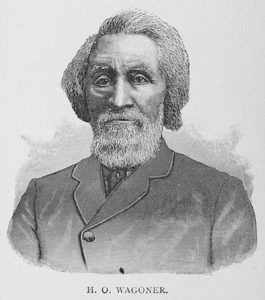
Henry Wagoner
*Henry Wagoner was born on this date in 1816. He was a Black abolitionist and civil rights activist.
Henry O. Wagoner was born in Hagerstown, Maryland. As a child, Wagoner was taught to read by his paternal grandmother but was rarely able to attend school, achieving less than a year's schooling while working on a farm. Starting about 1835, Wagoner became active in trying to free slaves, and he remained a part of the Underground Railroad and various anti-slavery movements.
On September 8, 1838, Wagoner left for the west. In Wheeling, West Virginia, Cincinnati, and Dayton, Ohio, he arrived in New Orleans on April 11, 1839, and then traveled through St. Louis, Missouri, finally settling in Galena, Illinois. There, he learned to set type and took work at the Northwestern Gazette and Galena Advertiser. In Galena, he befriended Elihu B. Washburne, with whom he did some business and maintained a friendship long after. After the American Civil War, he came to Denver, living in the Five Points neighborhood. In
1866, Wagoner hosted Frederick Douglass, Jr. and Lewis Henry Douglass in Denver and taught them typography. At this same time, along with William J. Hardin, Lewis taught reading, writing, and other subjects to adult Blacks in Wagoner's home until the Denver school board approved a segregated school building in 1867 and integrated public schools in 1873. Wagoner also operated a saloon and restaurant and in 1870 was estimated to be the wealthiest Black in the city according to the U.S. Census taken that year. Frederick Douglass would repay the favor in 1874 when he helped secure Wagoner's son, Henry O. Wagoner, Jr. a position as consular clerk in Paris. When Henry later died in Lyons, France, Douglass helped find a grave for Henry while touring Europe in 1886. In 1876,
Wagoner was appointed a clerk in the first Colorado State Legislature, and in 1880 he was appointed deputy sheriff of Arapahoe County, Colorado, where he worked as bailiff of the District Court. He served as sheriff for three years and also served as a ward election judge in Denver. In 1882, Wagoner briefly edited the Denver Star, which had recently been founded by Lewis Price. As an editor, Wagoner argued for civil rights, speaking out against Supreme Court decisions in the Civil Rights Cases in 1883 and Plessy v. Ferguson in 1896.
He was a commissioner at the 1884 World Cotton Centennial in New Orleans. Wagoner's wife, Susan, died in 1870. They had eight children, seven daughters, and a son. Only two daughters outlived him. Henry Wagoner died on January 27, 1901, at his home in Denver.